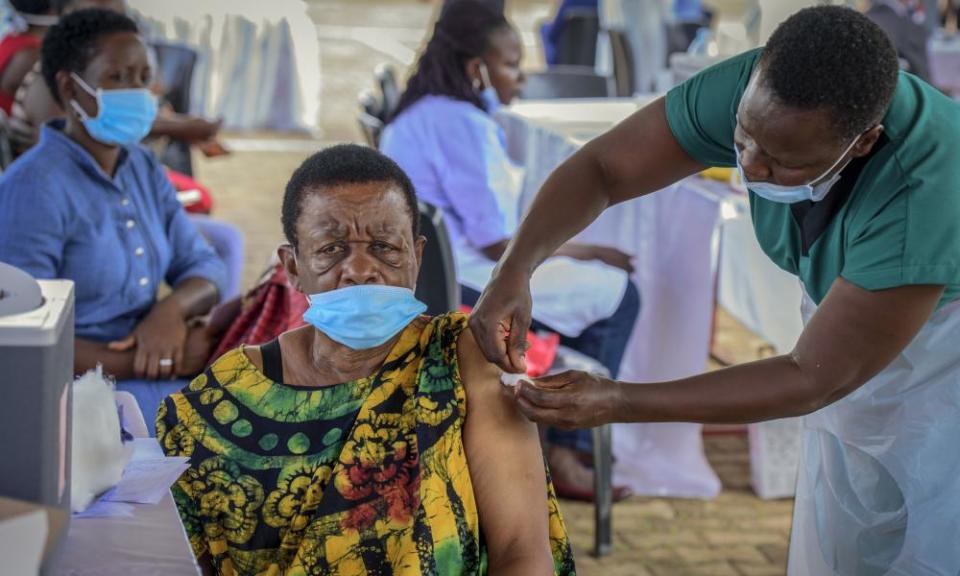Ugandan minister blames west for Covid vaccine shortage

A Ugandan government minister has blamed the west for his country’s inability to secure more Covid-19 vaccines, as the World Health Organization warned Africa urgently needed hundreds millions more jabs to fend off a surging third wave of infections.
Chris Baryomunsi said Uganda had been able to vaccinate more than a million people but was unable to obtain further shots.
“The problem has been the supply side,” said Baryomunsi, who is also an epidemiologist. “We have the money but we simply can’t get the vaccine. This is a challenge of access and equity. We have to rely on the western world and the western world has focused on its population. The impression is that people there don’t care about Africans.”
Uganda, which successfully repressed earlier waves of infection, has like other countries across Africa risked significant economic damage by imposing another severe lockdown.
“There was complacency that set in with the population and then a new variant that was much more aggressive,” Baryomunsi told the Guardian. “We have lost many people. The good news is that we have started to bring down infections.”
Dr Matshidiso Moeti, the WHO’s director for Africa, told reporters the continent had just marked its most dire pandemic week ever. “But the worst is yet to come as the fast-moving third wave continues to gain speed and new ground,” she said.
In the seven days to Thursday, the continent recorded 251,000 cases, a 21% increase. So far only 1.6% of vaccine doses administered globally have been given in Africa, and less than 2% of its population vaccinated.
“This leaves hundreds of millions of people still vulnerable to infection and serious illness,” Moeti said. “The end to this precipitous rise is still weeks away. We can still break the chain of transmission by testing, isolating contacts and cases and following key public health measures.”
Sixteen African countries are experiencing a resurgence of the virus, with the more contagious Delta variant detected in 10 of them. In all, 151,000 people have died across the continent. With limited testing and mortality statistics, both totals are thought to be very significant underestimates.
South Africa is the worst-hit country in Africa, with new daily infections hitting record highs, fuelled by the Delta variant and late responses from policymakers. Excess mortality figures in South Africa suggest more than 170,000 have died of the disease, though official statistics record 65,000.
Though infections in the country’s economic heartland of Gauteng province appeared to have reached a peak, the rest of South Africa is being hit hard, leading to further criticism of local authorities and the ruling African National Congress. Cyril Ramaphosa, the president, is likely to announce the extension of restrictions imposed two weeks ago when he addresses the nation on Sunday evening.
In Sudan, almost 200 doctors and other frontline health workers have died of Covid, and most are still waiting for vaccines, local medical staff said.
There is some hope for faster vaccine deliveries to Africa. The WHO said the Covax scheme, the UN-backed programme set up to ensure fair distribution of vaccines, was hoping to deliver more than 20m doses that are expected to arrive imminently from the US.
“Covax partners are working around the clock to clinch dose-sharing pledges and procurement deals with manufacturers to ensure that the most vulnerable Africans get a Covid-19 vaccination quickly.
“These efforts are paying off. Our appeals for ‘we first and not me first’ are finally turning talk into action. But the deliveries can’t come soon enough because the third wave looms large across the continent,” Moeti said.
Nineteen countries in Africa have used more than 80% of their Covax-supplied doses, while 31 countries have used more than half.
With even relatively wealthy countries such as South Africa failing to prepare for predictable surges of the virus, there are concerns that other governments across the continent are yet to sufficiently reinforce faltering health systems weakened by decades of underfunding, inefficiency and corruption.
In Tanzania, the government has moved to address problems caused by the policy of the late president John Magufuli, who denied the threat of Covid and failed to impose meaningful measures to restrict the spread of the disease. Since his death in March, authorities in the east African country have moved to publicly acknowledge the threat of the virus.
One doctor working in a major private hospital in Arusha, the capital, said the situation there remained very serious.
“People are dying every day. There’s not enough oxygen. We have to turn them away and they die at home. I think it will get worse before it gets better and that makes me despair,” the doctor, who requested anonymity because he was not authorised to talk to the media, said.
Boniface Kenn, a travel agent in Dar es Salaam, said the situation had deteriorated in recent weeks and was now “really, really bad”.
Tanzania is one of the countries on the continent that has suffered most acutely from travel restrictions, which have ruined tourism industries everywhere on the continent.
“It has been very tough. I’ve had trouble paying my rent, I’ve taken my kids out of school, sometimes I’ve not been able to feed my family. It will take a lot to recover from this,” Kenn said.

 Yahoo News
Yahoo News 